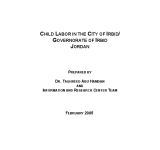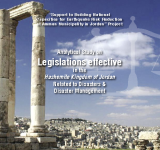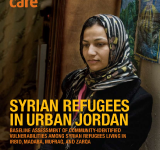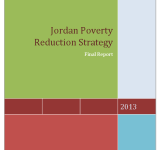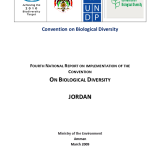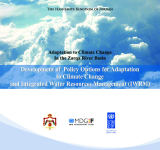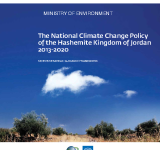In 2006;; the Sultanate of Oman undertook a project that aimed to support the implementation of the country’s vision towards conservation of biological diversity in the Sultanate of Oman. This report serves as an “evaluation and assessment of capacity building in the field of traditional knowledge related to biodiversity.” The report aims to describe the state of traditional knowledge on biodiversity in Oman;; assess capacity-building requirements in relation to traditional knowledge;; and provide a set of recommendations with a strategy for the protection and maintenance of traditional knowledge on biodiversity conservation. Various topics related to biodiversity are covered;; including irrigation;; tree cultivation;; crop improvement;; livestock management;; and soil and water conservation. The methodology used depends on three sources of information;; including a review of secondary data;; in-depth interviews;; and a participatory workshop.
والبيئة
This research study aims to investigate child labor in Irbid to provide a deep understanding of and knowledge about the socio-economic and cultural context of working children in Irbid. It also aims to propose intervention programs that maximize the effectiveness of the Family and Childhood Protection Society (FCPS);; an NGO in Irbid that works on issues related to children. Various study results have shown that children often work in dangerous and hazardous conditions where they are exposed to physical and psychological abuse;; in addition to exploitation in terms of minimal pay and long working hours. Both qualitative and quantitative methodologies were used to conduct the research presented in this report. In-depth interviews and questionnaires were used to collect data from all organizations working on child-related issues and from working children and their family members.
This study is an analytical study of the legislations effective in the Hashemite Kingdom of Jordan related to disasters and disasters management. It provides an overview of the disasters;; their types and management as well as an analysis of effective legislation related to disaster management in Jordan. The report concludes that To achieve consistency and integration among all ministries and public and private institutions concerned with facing disasters in all stages;; and to achieve the optimal use of available capabilities and resources as well as preventing duplication and overlapping which waste energies and in order to achieve the aforementioned disaster management principles;; there should be a certain authority responsible for disaster management in all its stages.
This report is a baseline assessment of community-identified vulnerabilities among Syrian refugees living in Amman;; Irbid;; Madaba;; Mufraq;; and Zarqa. The purpose of this report is to identify urban Syrian refugees’ current coping mechanisms and any gaps in services available to Syrian refugees in Jordan. The research methodology is both qualitative and participatory in design;; drawing from the UNHCR tool for Participatory Assessment in Operations. This report presents only the data from household interviews;; baseline assessment;; and the follow-up focus groups conducted with community members. The number of households surveyed was 240;; with a total number of 1;;476 household members and 89 focus group participants representing 534 household members. The report proposed general recommendations and interventions to deal with the main highlighted challenges (cash assistance;; strengthening community links;; vocational training;; physical activities ...etc).
The Government of Jordan adopted its first Poverty Alleviation Strategy in 2002 recognizing poverty as a key development problem requiring a comprehensive policy for improving the lives of the poor and socially excluded;; increasing their human capabilities;; providing them with economic opportunities and fully integrating them in the society. Considerable progress in poverty reduction has been achieved. The Government has put in place a series of social programs aimed at increasing employment opportunities;; curbing unemployment;; combating poverty and offering in-kind and cash assistance for the poor and marginalized groups within Jordanian society
This report was implemented by the Jordanian Ministry of Environment and is the forth national report on the implementation of the Convention on Biological Diversity. It provides an overview of biodiversity status;; trends and threats in Jordan;; current status of national biodiversity strategies and action plans and finally sectorial and cross-sectorial integration of biodiversity considerations in Jordan.
The report is directed at drawing a picture of the prevailing legal and institutional frameworks of the water sector in Jordan in relation to climate change adaptation in the Zarqa River Basin (ZRB). To achieve this purpose;; three tasks were conducted;; (1) literature of pertinent documents on legislation;; administration;; regulations;; water policies and water laws were reviewed;; (2) address the gaps in the water policies in Jordan as related to climate change vulnerability;; and to raise awareness of the importance of developing climate change mitigation measures;; and (3) propose policy options for adaptation to climate change through implementation of IWRM as a tool. The objective of the revision is the assessing the appropriateness and effectiveness of the existing institutional framework regarding the climate change adaptation measures in ZRB. Combating water scarcity remains a strategic challenge that Jordan faces for augmenting its water resources.
Jordan faces potential serious impacts on its natural ecosystems;; on its river basins and watersheds;; on biodiversity—then cascading to impacts on food productivity;; water resources;; human health;; public infrastructure;; and human settlements. Climate change will have serious implications on the country’s efforts to eradicate poverty and realize sustainable development for current and future generations— ultimately making climate change an issue of intergenerational equity. Climate change scenarios indicate that Jordan and the Middle East could suffer from reduced agricultural productivity and water availability among other negative impacts. At the same time;; a substantial potential for cost-effective reduction of GHG emissions exists in Jordan. The Policy will provide an overarching (umbrella/high level) guidance for the Government of Jordan to implement the major climate change objectives of national priority related to adaptation and mitigation of GHG emissions

